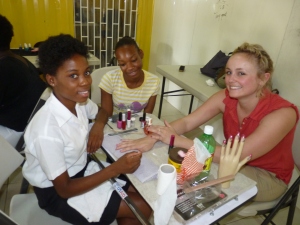When most people think of Jamaica, they think of sitting on a beach with clear water, white sand, palm trees, and reggae music playing in the background. Few people would think of a 13 year old girl living in poverty, being forced into prostitution by her brother. Unfortunately, this is not uncommon in Jamaica where sex tourism, poverty and unemployment fuel the forced prostitution of minors. In June the U.S. State Department released the 2010 Trafficking in Persons (TIP) report. The report ranks countries as Tier 1, Tier 2, Tier 2 Watch List, or Tier 3 (more info). This year, Jamaica was ranked Tier 2. Due to a high economic dependance on sex tourism, Jamaica will have a difficult time attempting to reduce their human trafficking problem.
History of Trafficking in Jamaica
In the beginning stages of formulating a plan for dealing with sex trafficking and child prostitution, Jamaica was ranked Tier 2 in 2003. The Ministry of Health began inspecting sex clubs and other places where minors were suspected to be employed. The Child Care and Protection Act (CCPA) passed in 2004, however trafficking was only in one section of the legislation. Because of this Jamaica was placed on the Tier 2 Watch List due to the lack of implementation by the government to combat human trafficking. In 2005 Jamaica was ranked Tier 3, because there was “no discernable action taken.” In light of being placed in Tier 3 and under pressure from the U.S., Jamaica conducted public awareness campaigns, created a task force, and increased law enforcement efforts. In 2007 Jamaica passed a comprehensive act called the Trafficking Act of Jamaica, which prohibited the trafficking of persons, including minors, for commercial sexual exploitation. Due to this legislation, Jamaica returned to Tier 2 and has maintained the rank for the past four years.There are many problems in Jamaica that make combating sex trafficking difficult. Jamaica’s garrison communities are not effectively controlled by the government, instead crime bosses or “Dons,” rule these poverty stricken areas and violently promote their criminal agendas. The Jamaican government has difficulty enforcing laws in these areas as many people fear the Dons more than the government. Jamaica also suffers from extreme poverty and over 14.5% unemployment. In 2007 a report on Jamaica identified poverty and unemployment as the main causes of sexual exploitation in Jamaica. Shared Hope International’s (SHI) 2007 “DEMAND” report stated that Jamaica’s heavy economic reliance on tourism fuels demand for commercial sex.
TIP Report Evaluation
The 2010 TIP report ranked Jamaica a Tier 2 country. Jamaica is a source, transit, and destination country for women and children specifically for forced prostitution. Poor women, girls, and increasingly boys, are being forced into prostitution in mostly urban and tourist areas due to the popularity of sex tourism.
Prosecution– No progress. In 2009, few traffickers were prosecuted, none were confirmed to be convicted, and many disappear on bail.
Protection– Some progress. In partnership with an NGO, the Jamaican government plans to partially fund three new shelters. Victims were generally not punished for trafficking related violations.
Prevention– Some progress. The government funded anti-trafficking campaigns in schools and libraries and funded one NGO to raise awareness among youth in rural communities.
Reactions and Responses
The government of Jamaica has not made a negative statement about the report or ranking, however there have been some comments made from newspapers and other sources about whether America has the authority to grade others’ progress. A commentary in the Jamaica Gleaner stated, “…I find it counterproductive for the US to stand in judgment of the world when the very evil it purports to eradicate is happening in abundance in its backyard.”(Quill). Although the U.S., like other countries, could always do more, the U.S. is doing a great deal to comply with the UN protocol to prevent, protect, and prosecute. For most countries this data may be useful in creating a strategy to combat human trafficking, or could serve as a wake up call to speed up policy formation. The report is not perfect, and politics guided the ranking of some countries. However, in the case of Jamaica, the ranking seems fair given the undeniable trafficking problem due to poverty, unemployment, and demand from the sex tourism industry.
Shared Hope International Efforts in Jamaica
Jamaica was one of the four countries investigated for SHI’s 2007 “Demand.” report on trafficking markets. Information from this report was submitted to Jamaica’s Constabulary Force which resulted in the rescue of a 14 year old girl.
Two partners in Jamaica currently provide shelter and services for victims. Theodora House and Project in Negril includes a shelter and a computer center to help provide vocational training. Additionally, SHI supports Hebron House, which is a home-like shelter which serves sexually exploited girls.
What Now?

With the release of the report and the ranking for Jamaica remaining the same for the 4thyear now, I hope that more will be done to combat this exploitive practice. Police must be trained in trafficking recognition, vigorously pursue traffickers, and conduct thorough investigations into suspected cases. Increased public awareness programs are necessary not only for residents but also sex tourists who come to Jamaica year round and and create demand for commercial sex with young girls. However, with extreme poverty, crime, limited resources, and increasing demand, these changes are going to be no easy task. That is why non-profits, NGOs, politicians, and grassroots organizations can not stop advocating for and supporting these women and children who can not speak for themselves.
If we do not stand up and defend them, then who will?






